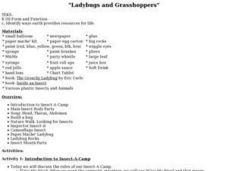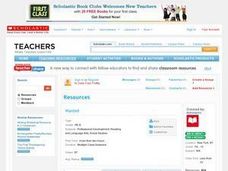Intel
Insects: The Good, The Bad, The Ugly
What would the world be like with no insects? Ponder this question using a research-based STEM unit that encourages scholars to investigate insects from both a beneficial and hazardous perspective. They learn about insect behaviors,...
Cornell University
Beneficial Insects
A lot of people think of insects as pests. But actually, some insects are beneficial because they get rid of pests! After learning about beneficial insects, class members research given insects to find out if they are pests or predators.
Curated OER
INSECTS AROUND US
Students identify characteristics of insects and if insects help or harm us. They describe the stages of metamorphosis.
Curated OER
Skeeterville
Students explore insect life by participating in a role-playing activity. In this mosquito life instructional activity, students listen to a role-play scenario in which they must protect a town from mosquitoes by creating a field guide...
Curated OER
The Dragonflies of Summer
The best thing about dragonflies is that they make great topics for informational texts. Get those readers excited with a fun and interesting insect-related text passage that can help them increase their comprehension skills. As children...
Curated OER
What is an Insect?
Students examine insects and identify physical characteristics of insects. They perform observations of insects, then use a worksheet imbedded in this plan to answer questions about them.
Curated OER
Interesting Insects
Students discover the characteristics of insects. They explore insects through cooperative learning, group projects, hands on activities, and poetry. They gain knowledge of insect life cycles, habitat, and physical characteristics.
Curated OER
What is An Insect?
Students investigate the concept of an insect. They conduct research about six different insects and identify the different body parts. Students look at the life cycle of the developing monarch butterfly. They also use the library to...
Curated OER
Insect Safari
Third graders name and identify three body parts of an insect, identify the characteristics that insects have six legs and one pair of antennae and categorize insects as to whether they are helpful or harmful.
Curated OER
Creepy, Crawly Critters
Young scholars study characteristics of insects by creating models from an assortment of materials. They create rubrics showing what an insect must have and create an insect, using a bag of materials. They cut out the puzzle insects...
Curated OER
Animals A to Z: Ladybug
In this ladybug worksheet, 3rd graders will read 10 facts about a ladybug to gain an understanding of the insect's characteristics. Students will locate 10 errors of punctuation, capitalization, spelling, and grammar.
Curated OER
COMMON KINDS OF INSECTS
Learners will recognize and name three common insects.1. Share background information with students. 2. Provide learners with the "bug body" puzzle pages, and have them cut the puzzles out.1. Share background information with students....
Curated OER
Bugging Out
Students explore how insects behave in their natural habitats and build dioramas to create an Insect World in their classroom. They investigate various insects and the roles they play in the environment. They write creative short...
Curated OER
Activity Plan 5-6: Bugs, Bugs, Bugs!
Young scholars become entomologists for a day. In this life science lesson plan, students go on an insect hunt and investigate insects and their homes. This leads to the creation of an insect by each student. Lesson includes a...
Curated OER
Symbiosis: Help, Hinder or Destroy
Use background information and vocabulary to familiarize your students with the concept of symbiosis and the role agriculture plays in the shared relationship. They then write the vocabulary in their lab books or journals, and read the...
Curated OER
The Amazing Ant
Students explain that ants are an important element of nature's balance. Ants eat many insects and are food to other animals. They watch a video and conduct hands-on activities that give them an excellent overview of the ants role in...
Curated OER
Protect Yourself
Students read about the marketing of permethrin-treated clothing to help prevent insect borne illnesses. They design a poster to create awareness of an insect, animal or plant species which is harmful to humans.
Curated OER
Choose Your Defense: Spines, Vomit and Camouflage
Students investigate defensive mechanisms of insects and organisms. In this biology lesson, students draw imaginary caterpillars as well as imaginary parasites that will harm the caterpillar. Students utilize the Internet to discover...
Curated OER
"Ladybugs and Grasshoppers"
Students paricipate in number of activities related to ladybugs and grasshoppers.
Curated OER
Homeschooling Chronicles - Insects
The world of bugs may be small, but they can have a big impact on the lives of nature explorers like my children.
Curated OER
Wanted!!
Fourth graders study insects in their habitats looking at survival characteristics and whether the insect is a predator or an herbivore. They investigate characteristics that improve the survival of a species and its ability to reproduce.
Curated OER
What are rice farmers doing to help the environment with their water-filled rice fields?
Third graders research rice fields. In this rice fields instructional activity, 3rd graders discuss how fields contribute to the environment by providing an important food source for birds. They find the benefits of rice fields to water...
Cornell University
Weed IPM
Go on a weed hunt! Scholars gain insight into the characteristics of plants and examine the outdoor environment in order to identify five different types of weeds. Learners then show what they know with a one-page reflection.
Curated OER
Forest Fires
Students discuss the benefits and problems associated with fire. They discuss the role that fire plays in maintaining healthy ecosystems. Students brainstorm ways that fire can be harmful, such as damaging homes, communities, and...

























